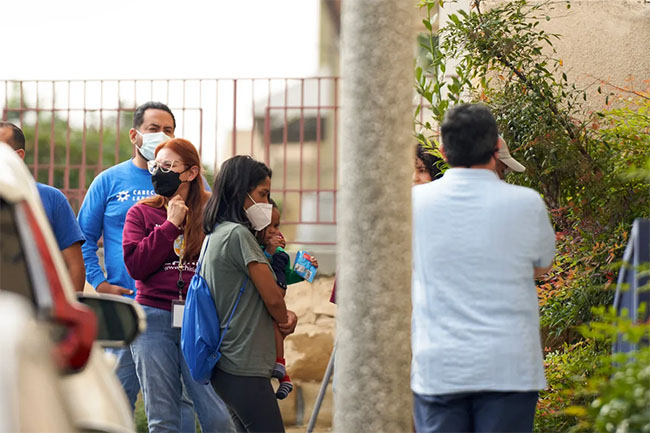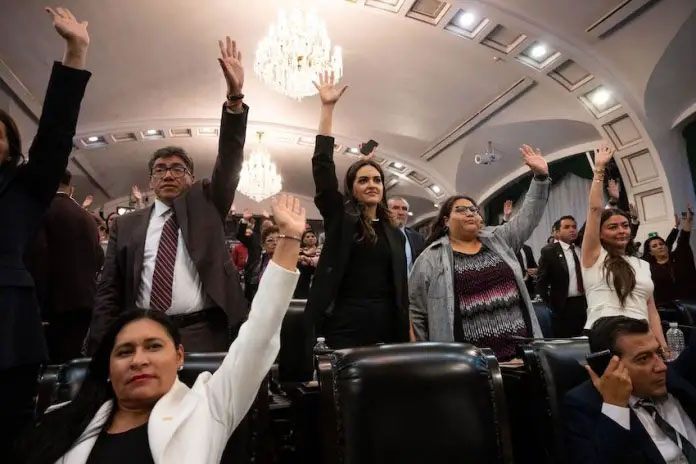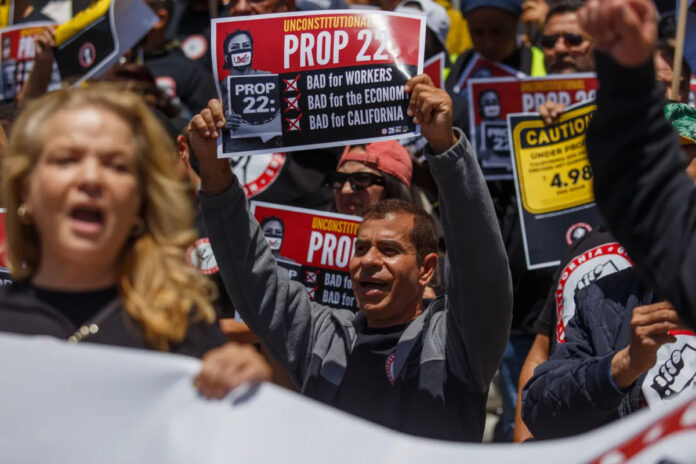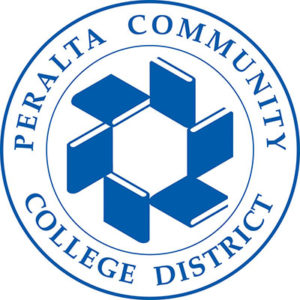by Levi Sumagaysay
Prop. 22 promised improved pay and benefits for California gig workers. But when companies fail to deliver, the state isn’t doing much to help push back
Nearly four years after California voters approved better wages and health benefits for ride-hailing drivers and delivery workers, no one is actually ensuring they are provided, according to state agencies, interviews with workers and a review of wage claims filed with the state.
Voters mandated the benefits in November 2020 when they approved Proposition 22. The ballot initiative was backed by gig-work companies that wanted to keep their workers classified as independent contractors and were resisting a 2019 state law that would have considered them employees. Prop. 22 stipulated that gig workers would remain independent contractors but be treated better.
The state Industrial Relations Department, which handles wage claims, now tells CalMatters it does not have jurisdiction to resolve those related to Prop. 22, citing a July 25 California Supreme Court ruling that upheld the law and therefore maintains that gig workers are not employees. That effectively passes enforcement responsibility on to the state attorney general, whose office was noncommittal when asked about its plans, saying that it does not adjudicate individual claims but does prosecute companies that systematically violate the law.
The lack of enforcement leaves in limbo workers who in many cases have already been waiting for months or years for the state to resolve their complaints. Workers have filed 54 claims related to Prop. 22 since it went into effect in December 2020. At least 32 of them are unresolved, state records obtained by CalMatters show, although at least two of those are due to workers not following through.
Of the unresolved claims, one goes back to 2021, several are from 2022 and 2023, and about half are from this year, through May.
Emails included with the claims show that the Industrial Relations Department told one worker it was severely understaffed, and seven others, starting in 2022, that it did not have jurisdiction to help them since they were independent contractors rather than employees.
Although the number of claims filed with the state represent just a fraction of the more than 1 million gig workers in California, they give a glimpse into what happens when workers turn to the state for help instead of the companies that backed Prop. 22.
Workers say in the claims, and in interviews with CalMatters, that companies such as Uber, Lyft and Instacart failed to provide higher wages and health care stipends under the law, and that the companies’ representatives sometimes act confused or take a long time to handle their requests for Prop. 22 benefits. The gig companies have touted the law as something that has boosted pay and benefits, and have said it has helped gig workers hang on to work they can do whenever they want.
Laura Robinson is among the workers who have had to aggressively pursue what they believe they’re owed under the law. For the past year, she has filed claims with the state and fought two different gig-work companies for different benefits promised under Prop. 22.
She was making a delivery for Instacart a year ago, she said, when a driver making a U-turn hit her, totaling her car. Now, she said, she has lingering back pain, and has only been able to make a total of a few deliveries over the past several months.
Robinson, who lives in Irvine, tried to get Instacart to retroactively provide her with occupational accident insurance as required under Prop. 22.
When she first contacted Instacart about the collision, “four or five different (representatives) told me on chat ‘we don’t provide insurance,’ but I told them this is California,” Robinson said. “Finally someone said ‘oh yeah, I know what you’re talking about.’ ” Robinson had some difficulties documenting the accident, because, she said, the responding Torrance Police Department officer rode away on his motorcycle without writing a report. But after about seven months, she finally heard back from Zurich, Instacart’s insurance provider. She received a lump sum, and monthly payments for the time that she has been largely unable to work, according to bank statements and emails from Zurich to her, which she shared with CalMatters.
Instacart spokesperson Charlotte Healow said all the company’s shopper support agents should know about “shopper injury protection” and that there is information in the app about how to go about filing claims. But Robinson showed CalMatters several screenshots of her chats with support agents who either thought she was asking about health insurance or who told her someone would email her back about her situation — which eventually happened, though it took a few tries.
Robinson said she had also struggled to get a smaller gig platform, food delivery app Curri, to comply with the law. Under Prop. 22, ride-hailing and delivery gig companies are supposed to pay her 120 percent of minimum wage for the time she spends driving, making up for any shortfall in the pay she receives, but Curri had not done so, she said. Not knowing where to turn, she asked a few different state agencies for help, including the attorney general’s office. She even lodged a complaint with the Federal Motor Carrier Safety Administration’s National Consumer Complaint Database. After several months, the Industrial Relations Department scheduled a hearing for her case for Aug. 29. Last week, the department told her the company decided to settle and pay her what it owed, according to emails and a release she signed that she shared with CalMatters. Curri’s marketing director referred CalMatters to the company’s legal department, which did not return three emailed requests for comment.
Robinson saw the upside of Prop. 22 after it passed. She liked being able to continue setting her own hours and saw a bump in her earnings delivering for Grubhub due to the law. But she is now frustrated about how tough it was to figure out who’s supposed to be upholding it.
“It’s not helpful if it’s not enforced or applied,” she said.
Robinson said the deputy labor commissioner she was in touch with throughout the process of pursuing her claim against Curri told her last week that because Prop. 22 was upheld by the state Supreme Court — effectively ensuring gig workers cannot be considered employees — the department would no longer be handling similar cases because it does not have jurisdiction over independent contractors.
What gig workers are complaining about
The Prop. 22-related wage claims reviewed by CalMatters were part of a larger set of nearly 200 claims that gig workers filed with the Industrial Relations Department since the law took effect in December 2020. Citing the California Public Records Act, CalMatters sought all wage claims in that timeframe involving gig companies, but the state did not provide any claims against DoorDash, which is one of the biggest of the app-based gig companies. A department spokesperson could not explain why.
Most of the claimants sought delayed or unpaid wages, including adjustments owed under Prop. 22. Others sought health care stipends required under the gig-work law, and one driver said he sought occupational accident insurance but did not receive it.
The claims also shed light on the mechanics of how app companies are allegedly withholding wages. In them, some gig workers claimed that they were deactivated — kicked off or fired by the app — before receiving all their wages.
The records also indicate the state had trouble holding app companies to account in a timely fashion. In emails about the claims, some workers frequently asked for updates about their cases and complained about limited communications from the state. This prompted one supervisor in the Industrial Relations Department’s San Francisco office to respond by email on May 30, 2024, seemingly noting that gig workers’ complaints were just a fraction of the array of worker complaints the state fields: “I am working with 40 percent staff shortage. There are over 3,000 cases, most of which are older than yours, and only seven people (total) to handle them.” The department did not respond to requests for comment on whether this shortfall persists.
Monetary wage claims ranged from about $2 to nearly $420,000. Most — 54 percent — were against ride-hailing and delivery giant Uber and 25 percent were against its rides competitor Lyft. There were 17 claims against grocery-delivery app maker Instacart, seven against food-delivery platform Grubhub, four against Target-owned delivery service Shipt and three against UPS-owned delivery service Roadie.
The Industrial Relations Department has long tried to resolve gig workers’ wage disputes. The labor commissioner, who heads the department’s Labor Standards Enforcement Division, still has pending wage-theft lawsuits against Uber and Lyft that it filed in 2020 on behalf of about 5,000 workers with wage claims going back to 2017.
Those cases predate Prop. 22, originating during a period when gig workers were misclassified and should have been considered employees under California law, the labor commissioner argues in the wage-theft suits. After Prop. 22 passed, opponents challenged it and the case ended up before the California Supreme Court, which upheld the law in July, effectively affirming that drivers are independent contractors, not employees. A department spokesperson, Peter Melton, said the ruling means the department can no longer handle claims about missing wage adjustments under the earnings guarantee, unpaid health care stipends or other aspects of the law.
Department representatives made similar statements to workers even before Prop. 22 was upheld, the claims records show. An email response, dated March 26, 2024, from the department to an Uber driver stated: “The Division of Labor Standards Enforcement enforces employment law. We cannot enforce Prop 22 earnings because they aren’t ‘wages’ earned by ‘employees’.”
This echoes the position lawyers for Uber and Lyft took in some of the records when responding to wage claims. They asked the state to dismiss such claims, writing in one email: “As of December 16, 2020, drivers using Lyft’s platform are considered independent contractors by statute and, thus, cannot seek relief under the Labor Code.”
Now that the department has disavowed responsibility for Prop. 22 claims, the question remains: Who will enforce the law?
Scott Kronland, the attorney for Service Employees International Union California who unsuccessfully argued before the state Supreme Court that it should throw out Prop. 22, told CalMatters: “I’ve also heard from drivers that they’re not getting the things they’re promised by Prop. 22.”
Kronland said their recourse, after the ruling, is to press local prosecutors or the attorney general, who have the ability to hold companies liable for unlawful business practices under the state’s Unfair Competition Law. Still, he said “enforcement is something the Legislature could clarify.”
In an unsigned email response to CalMatters’ questions after the state Supreme Court decision, including whether it planned to pursue Prop.-22-related cases against gig-work companies, the attorney general’s office said gig workers can submit complaints at oag.ca.gov/report. The email added: “Although the Attorney General does not represent individual workers or adjudicate individual complaints by holding administrative hearings like (the Department of Industrial Relations), DOJ brings lawsuits to hold accountable companies that systematically break the law, for example through widespread violations of wage and hour standards. Reports or complaints of employer misconduct are an important part of our work.”
When CalMatters previously asked the attorney general’s office for copies of any wage complaints it had received from gig workers thus far, a spokesperson responded that the office was representing the state in its effort to defend Prop. 22 before the California Supreme Court — and referred CalMatters back to the Industrial Relations Department.
What gig companies share about Prop. 22’s impact
Gig companies have said that, due in part to the initiative’s earnings guarantee, workers now make more than $30 an hour. But a May study by the UC Berkeley Labor Center found that, for California ride-hailing drivers, average earnings after expenses, not including tips, is about $7.12 an hour, and for delivery workers, $5.93. With tips, drivers’ average hourly earnings are $9.09 an hour, and $13.62 for delivery workers, the study found.
To better understand the impact of Prop. 22, CalMatters asked each of the four largest gig companies — Uber, Lyft, DoorDash and Instacart — the following:
- How much they have spent on delivering on each of Prop. 22’s four main promises:
- 120 percent of minimum wage earnings guarantee
- Health care stipends
- Occupational accident insurance
- Accidental death insurance
- How many gig workers have received each of the promised benefits.
- Whether they have passed on costs to consumers, and if so, where they account for those customer fees in their public financial filings.
- How they handle complaints or issues related to their promises.
Lyft said 85 percent of California Lyft drivers who have driven for the company since Prop. 22 went into effect have received at least one wage “top up” — the additional money drivers receive under the earnings guarantee — through the end of the fourth quarter of 2023, though spokesperson Shadawn Reddick-Smith would not provide specific numbers of Lyft drivers in the state. None of the other companies would give any information on their delivery of the wage guarantee.
Instacart spokesperson Healow said the company has paid out about $40 million in health care subsidies to its delivery workers, which she said number in the tens of thousands in the state. She also said about 11 percent of California shoppers have become eligible for a health care stipend since Prop. 22 took effect, and that 28 percent of those eligible shoppers have redeemed their subsidy.
To qualify for the health care stipends, workers must work at least 15 hours a week each quarter, and be enrolled in health insurance that is not provided by an employer or the government. Because the gig companies won’t share how many workers have received the stipends, CalMatters asked the state health insurance exchange, Covered California, if it had data that might help shed some light. Seven percent of the 1.6 million people who used Covered California reported doing gig work in a 2023 survey, said a spokesperson for the exchange, Jagdip Dhillon.
DoorDash spokesperson Parker Dorrough said that just 11 percent of eligible couriers used the health care stipend in the fourth quarter of 2023 but that 80 percent of DoorDash’s delivery workers had health care coverage through another source, such as their full-time job or spouse.
None of the other companies would give any information on their delivery of the stipend. Lyft’s Reddick-Smith said 80 percent of California Lyft drivers already have health care coverage, including 13 percent who bought their own coverage (this second group is the set of drivers who qualified for the stipend).
None of the four companies provided the numbers of workers who have used occupational accident or accidental death insurance.
None of the companies would disclose how they account for the fees they charge customers for Prop. 22 expenses, nor are the fees included in their publicly available financial filings. Instacart said it does not charge customers for expenses associated with Prop. 22. Lyft said its per-ride service fee includes a 75-cent “California Driver Benefits Fee.” Uber charges customers a “CA Driver Benefits” fee for each ride and delivery in the state and spokesperson Zahid Arab said the company has “invested more than we collected in fees.”
Uber published a blog post after CalMatters’ questions, saying it has “invested” more than $1 billion in Prop. 22 benefits. Arab would not break down these benefits further.
As for complaints related to the promises, each of the companies said workers should contact support agents, whom they can usually get in touch with in the app; an Instacart spokesperson said workers can make some claims directly in the company’s app.
Seeing little from Prop. 22
Ride-hailing driver Sergio Avedian last year helped raise public awareness of the lack of Prop. 22 enforcement. Specifically, he homed in on one narrow issue: Under the law, gig-work companies were supposed to adjust for inflation each year the reimbursement they pay to drivers for mileage. Avedian said no such adjustment had taken place for two consecutive years. And as a podcaster and contributor to the Rideshare Guy, a popular gig-work blog, he had a high profile. Avedian and a fellow eagle-eyed driver started pestering the state’s treasurer’s office, which had not published the adjusted rates as stipulated under Prop 22. The office eventually did so and, the Los Angeles Times reported, put the state’s gig workers on track to get back pay for the mileage expenses — pay potentially worth hundreds of millions of dollars.
Now, a year later, Avedian is curious about gig-company math again. He has asked Uber some of the same questions CalMatters did — including how the company accounts for the driver-benefits fee it adds on to each ride or delivery. The company’s response to him was similar — it provided few specifics.
Besides his concern about the issue as a driver, Avedian said “as a consumer who is paying into the Prop. 22 fund on every trip or delivery, I would like to know the accounting of where my money is going.”
“We’re not completely independent contractors. We’re not employees. We’re sort of a hybrid model of theirs. We’re pretty much nobody.”
Yasha Timenovich, ride-hailing driver
When the gig companies were campaigning for Prop. 22, they implored voters to “help create a better path forward for drivers.”
But Avedian and other gig workers in California say their paths have not changed much. Many still complain about low wages, little transparency from the companies and lack of worker protections.
Yasha Timenovich said he has worked as a ride-hailing driver for a decade, first with Uber, now with Lyft.
“I work 12, 13, 14 hours a day,” said Timenovich, who drives in the Los Angeles area. “But the time I sit and wait at LAX is not accounted for.” He said he has to work long hours to try to make sure he has enough earnings. “We’re not completely independent contractors. We’re not employees. We’re sort of a hybrid model of theirs. We’re pretty much nobody.”
He also said he must obtain health insurance through Medi-Cal, California’s health care coverage for low-income residents — which in turn means he doesn’t qualify for the health care stipend. He said every driver he knows “is on Medi-Cal because they can’t afford health insurance. I don’t know anyone who has (the stipend).”
Many drivers voted for Prop. 22, he said. But “what we were told was a lie.”












